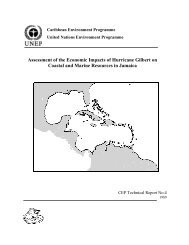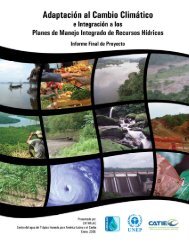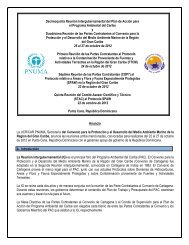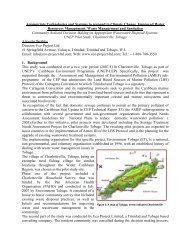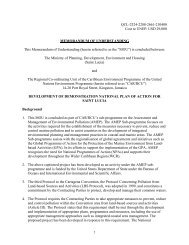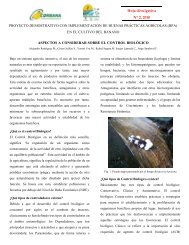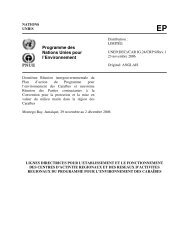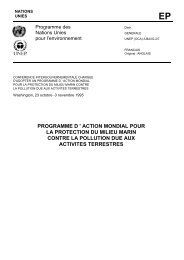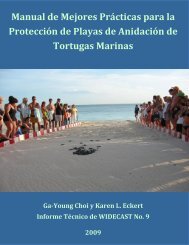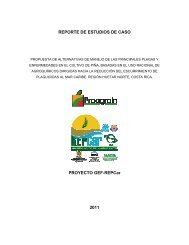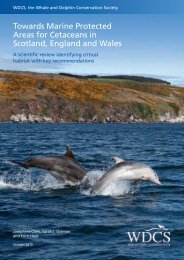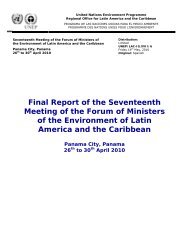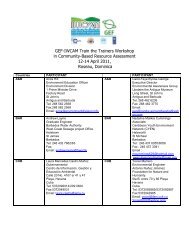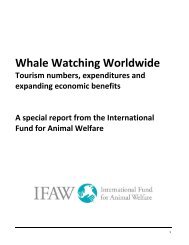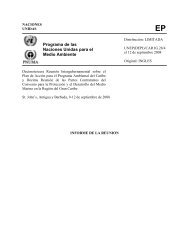Sea Turtle Recovery Action Plan for Barbados - WIDECAST
Sea Turtle Recovery Action Plan for Barbados - WIDECAST
Sea Turtle Recovery Action Plan for Barbados - WIDECAST
You also want an ePaper? Increase the reach of your titles
YUMPU automatically turns print PDFs into web optimized ePapers that Google loves.
<strong>Barbados</strong> <strong>Sea</strong> <strong>Turtle</strong>s …<br />
4.142 Bleaching reefs (by man)<br />
It is illegal to use bleach or other chemicals <strong>for</strong> the purpose of fishing in <strong>Barbados</strong><br />
(section 4.21) and this practice is not known to occur. However, many houses and hotels on the<br />
west and south coasts have swimming pools with filter backwashes discharging into the coastal<br />
zone. Chlorine is extremely toxic to corals, and local deleterious effects on coral reefs have been<br />
documented. As part of the Coastal Conservation Project Phase II, the sources of near-shore<br />
pollutants, including chlorine from swimming pools, industrial and agricultural pollutants and<br />
sewage are being identified. Because healthy coral reef ecosystems are crucially important to<br />
sustainable fisheries and tourism (both economically important industries in <strong>Barbados</strong>), as well<br />
as to sea turtles (providing them with food and shelter), it is the recommendation of this<br />
<strong>Recovery</strong> <strong>Action</strong> <strong>Plan</strong> that deleterious discharges of chlorine into the sea be illegal at all times<br />
and under all circumstances. Penalties should be stiff enough to serve as a deterrent to the use or<br />
discharge of chlorine and other toxic chemicals in the marine environment.<br />
4.143 Industrial discharges<br />
Toxic effluents from the rum refinery and heated effluents from the power station pose<br />
serious pollution problems in the area where they are released (Brighton), with decreasing effect<br />
on reef quality with distance from the source (Tomascik and Sander, 1985). The rum refinery<br />
effluent contains yeast, methanol, higher alcohols, aldehydes, ketones and esters and has a high<br />
BOD [biological oxygen demand] loading (Coastal Conservation Project, 1984). The Coastal<br />
Conservation Project (1984) advised that a long term solution may be to link these sources of<br />
nearshore pollution to planned sewage systems. However, sewage systems are not generally<br />
designed to handle these chemicals and another method of disposal may be more effective.<br />
Solutions are sorely needed in this regard, and field studies are necessary to ascertain the extent<br />
to which effluents of other types are degrading the marine environment of <strong>Barbados</strong>.<br />
4.144 At-sea dumping of garbage<br />
The discharge of sewage, oil, garbage, plastic, toxic materials, discarded fishing gear,<br />
styrofoam and a myriad of other materials into the ocean is a serious regional and global problem<br />
(e.g., O'Hara et al., 1986; CEE, 1987; Laist, 1987). The beaches of the east and southeast coasts<br />
of <strong>Barbados</strong> are most affected by garbage, sometimes dumped from boats at sea and sometimes<br />
derived from land-based sources. Fishing boats, yachts, cruise-liners, and military vessels dump<br />
their refuse at sea; sometimes the country of origin can be identified by examining the refuse.<br />
The discharge of garbage into the sea is a particular problem <strong>for</strong> sea turtles; both ingestion of and<br />
entanglement in persistent debris can be fatal to sea turtles.<br />
The <strong>Barbados</strong> Environmental Association monitors the amount and types of garbage<br />
found on beaches during sea turtle nesting beach surveys and clean-ups, and supplies this<br />
in<strong>for</strong>mation to the Center <strong>for</strong> Marine Conservation, an organization in Washington D. C. that is<br />
analyzing the occurrence of marine debris on a regional and global scale. Bellairs Research<br />
Institute has recently started monthly monitoring of garbage on two beaches as part of the marine<br />
debris monitoring programme of IOCARIBE/CEPPOL. Legislation prohibiting pollution of<br />
territorial waters already exists (section 4.21), but more effective en<strong>for</strong>cement is needed.<br />
Page 19



